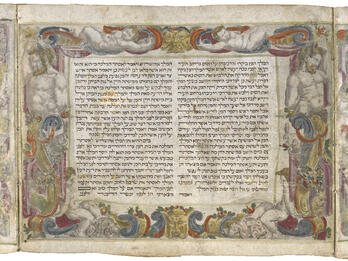Responsum: On Resorting to Non-Jewish Law Courts
And now we see that the number of servants breaking away from their Master, our Heavenly Father, increases daily, in that whenever they have a quarrel with their Jewish brothers or sisters they have recourse, contemptuously and obstinately, to the gentiles’ law and their courts, and in the height of their rage do not go to seek the Almighty and the upholders of His Torah by having their cases determined under the law of Israel—and they directly destroy Jewish financial resources through their denunciations and false allegations. They dismiss with a mere movement of the lip the upholders of the Torah, wagging their heads, and place their reliance upon a gentile ruler, an official or law enforcement officer, releasing themselves from the Jewish laws—and for this the land mourns and all its inhabitants languish; our holy Torah too dons sackcloth, and the Torah has a complaint against all those who uphold it, and those sitting in judgment who stand aside and fail to explore all possible ways to erect fences to repair this breach even where no danger exists and there is no need to curry favor. As I have personally witnessed—not relying on strangers’ reports—the wicked deed perpetrated by Isaac Tizano, resident in Cremona, who had a legal dispute with R. Jacob Mortera and his brother, and he [Isaac] went with improper intention and arrogance to the gentile court and quarreled with R. Jacob who had gone to perform a circumcision in Casale Mazoro [or Mauro; location unidentified], when he dispatched one of the officials of the department for overseeing Jewish affairs there with his partner’s brother to discover precisely who this Jacob Mortera was, and had him handed over to the governor of Casale Mauro, whereupon he was compelled to provide a guarantee of five hundred scudi to prevent him being imprisoned. And I have sent [a letter], in my own handwriting, addressed to this Isaac, with R. Jacob Rabba, containing nice words and conciliatory messages, requesting him not to follow the laws of the gentiles, and that if he had a suit against R. Jacob Mortera and his brother, he should be prepared to select judges jointly with him, under Jewish law, in one of the locations he might choose [see m. Sanhedrin 3:1], in Mantua, Padua, or Venice, and not continue in sin. But he did not wish to take my letter or read it. And moreover he performed this evil deed and told the overseer of the Jews that I had sent him a letter for the purpose of extricating him from the gentile courts, which resulted in the authorities’ ordering R. Jacob Rabba to ensure that he did not hand over any document from the Jewish judges to Isaac, and stating that their wrath would descend upon anyone bringing him any document designed to extricate him from their courts—and he did not explain. And I added a further message—I and the most eminent rabbis of Mantua—which we sent with a designated man (Leviticus 16:21), an agent of the bet din, to warn this Isaac Tizano in Cremona verbally—since we were not allowed to write down our disagreement—that [he should have] R. Jacob Mortera and his brother removed from the gentile courts’ jurisdiction and that he should pursue his suit with them before Jewish judges in a locality where there were upholders of the Torah, employing the mechanism whereby each litigant selects one judge for himself, in Mantua, Padua, or Venice, and there justice should take its due course, so that idolatry might not be glorified by investing it with importance through going to their courts thereby desecrating the honor of our God and His holy Torah. But he responded to us, through the agent of the bet din, in unrealistic mode, with numerous nonsensical matters and false allegations. [ . . . ]
Accordingly, we can learn from all this that even if the position were as stated by Isaac, he should not have compelled R. Jacob Mortera and his brother to litigate in the gentile courts without permission of the upholders of the Torah or the eminent communal authorities. All the more so! Now this is applicable, when R. Jacob protests vehemently that Isaac has spoken falsely against him, as he had always been prepared to obey the legal verdict concerning himself and had never declined, nor refused to choose judges with him. Consequently, now that he has responded to us that he has no wish to have his case against R. Jacob and his brother decided under Jewish law, but chooses to have his case adjudicated only by the laws of the gentiles and their courts, and that every controversy should be determined pursuant to their declaration, who can fail to arise against him in judgment, like a refining fire and fullers’ soap (Proverbs 3:2), to establish justice in the land, to repair the breaches in our holy Torah which is desecrated by the nations? May the feet of those despicable and lowly ones who say in their hearts: “Who will bring me down to the ground?” be trampled down!
Therefore I, the lowliest among the thousands of Israel, have arisen to act zealously for the Lord and to demonstrate to the Almighty’s people, who pursue the Jewish path before God, and that in the land will smite with a corrective sword those traveling upon an evil path, profaning the name of the Almighty and His holy Torah [ . . . ]; and I hereby decree, on pain of ostracism, excommunication, and the ban, upon every community in each town, that they must separate from this Isaac Tizano, residing in Cremona, to prevent his participation in divine service within the community by allowing themselves to join with him in the quorum of ten for any sacred function; nor are they to sit within four cubits of him, under the law governing an excommunicate, until he releases R. Jacob Mortera and sets aside all the gentile courts’ judgments to which he has subjected him, and that if he has litigation against him, he should select judges on the basis of each litigant selecting one judge for himself, in one of the locations chosen by him—for thrones for judgment are established there (Psalms 122:5)—in Mantua, Padua, or Venice. And he must comply with whatever verdict issues from the two judges selected, should they mutually concur [ . . . ] and not weaken his resolve or hasten again to the gentile courts. He must accord honor to our God and His holy Torah. And until he repents of his evil way and terminates the gentile courts’ jurisdiction and no longer acts ruthlessly and wickedly, he is to remain segregated from every community under the law governing an excommunicate, who is contemptible and tainted, profaning the Almighty and despising the Torah of Moses by glorifying idolatry and investing it with importance. And every man or woman who has attained the legal age for punishment shall ensure they avoid sinning by approaching him, lest the serpent, i.e., ostracism, excommunication, and the ban [the initials of these words spell the word serpent] bite without being charmed. [ . . . ] Heaven forbid! However, should this Isaac Tizano, living in Cremona, listen to me and guard the way to the Tree of Life by having R. Jacob removed from the gentile courts’ jurisdiction which he has imposed upon him, and litigate with him under Jewish law in one of the locations mentioned by me, with each party selecting his own judge, and not continue rebelling against the honor of the Almighty and His Torah, I shall praise the Lord; may He order His blessing to fall upon him, and may no aspect of his curse still cling to him; may there be glory and tranquility in his resting place, and may all those who love him rejoice over the burden he has undertaken and his service to God—for he will have observed the ways of the Almighty and repented of his wickedness!
Credits
Published in: The Posen Library of Jewish Culture and Civilization, vol. 5.





